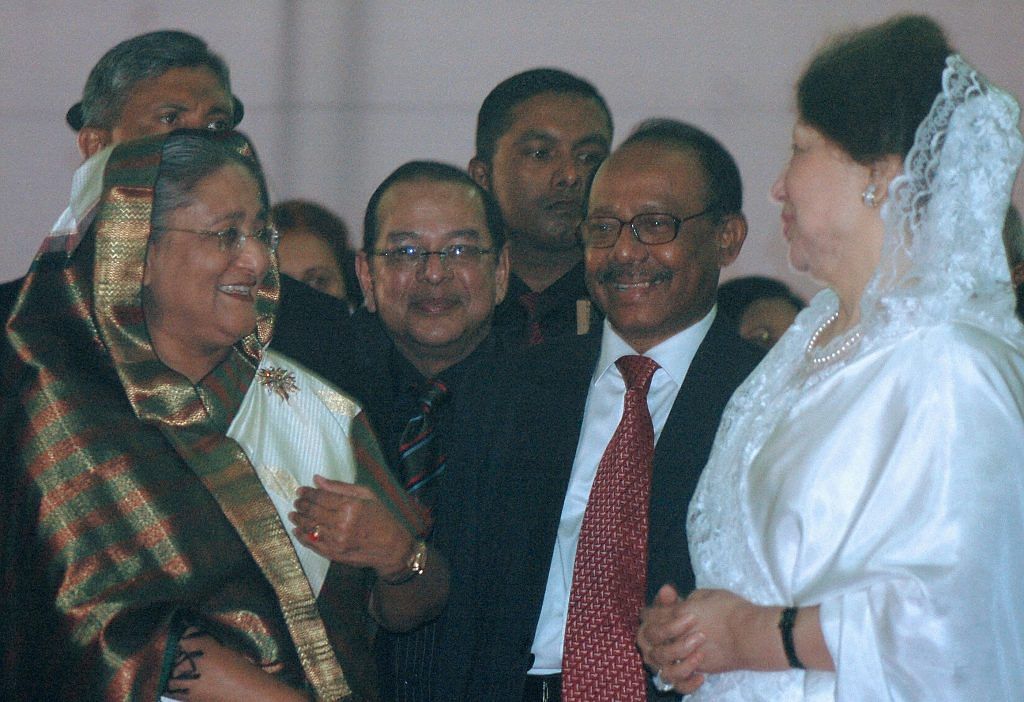Sheikh Hasina may win the election scheduled for January 2019, but ordinary Bangladeshis are fed up with her iron-fist rule.
Bangladesh prime minister Sheikh Hasina is in Toronto these days, being feted by the Canadian faction of the Awami League, while her key opponent, Khaleda Zia of the Bangladesh Nationalist Party (BNP), waits in the old Dhaka jail for fate to take her by the hand and thrust her back into the limelight to which she so wants to belong.
But the 72-year-old Khaleda, jailed on 8 February on charges of embezzling a mere $252,000 via the Zia Orphanage Trust, has been waiting for more than four months. The holy month of Ramzan is almost over. On 5 June, she was overcome by a dizzy spell, probably induced by fasting, and fell to the ground.
That provoked, in the pages of Bangladesh’s leading daily, ‘The Daily Star’, two revealing headlines. “Khaleda may have suffered mild stroke,” said one, quoting her personal physicians as saying that the fall may have been the result of a stroke. The other headline, “Khaleda didn’t suffer mild stroke: AG”, quoted silver-haired attorney-general Mahbubey Alam as saying the weakness was caused by a drop in her blood sugar levels, not by a stroke.
Be that as it may. Question is: why is an ex-prime minister being treated so shabbily, six months before Bangladesh goes to polls again? BNP leaders want the ageing Khaleda to be sent for a check-up to a private hospital, but the government has put its stingy foot down and is small-mindedly insisting that it can only pay the costs for her to go to a government hospital.
Meanwhile, the all-powerful Hasina has been photographed in Toronto in a gorgeous silk sari, saying Bangladesh will become a failed state “if the anti-liberation forces and patrons of killers return to power”. She means the BNP, of course, which refused to take action against the assassins of her father.
But for the first time in years, the daughter of Bangabandhu, the man who broke up Pakistan, may have miscalculated. She may still win the election scheduled for January 2019, but ordinary Bangladeshis are so fed up with the iron fist with which she has been ruling for some time that human rights and pro-democracy activists are embarrassed.
In the name of cracking down on Islamist terror groups, Hasina has expanded the ambit of security forces, throwing people in jail on the merest of suspicion or none at all. Several Awami League insiders say they are unhappy that their party, forged in the fight of independence, has become both bureaucratic and anti-democratic.
The arrest of Khaleda Zia in February is a case in point. Khaleda now has 34 cases against her, so one or the other always comes up in front of the court, which means that bail is a distant dream. Her son, Tarique Rahman, is in exile in the UK. As many as 78,000 cases against nearly 18 lakh BNP workers have been filed. Clearly, the attempt is to intimidate the main opposition party so that it gets fed up and throws in the towel – like it did last time around in 2014, when it refused to fight the election.
Not that the BNP is washed in milk. During her two tenures in power, from 1991-96 and 2001-2006, Khaleda’s BNP allegedly encouraged anti-Indian terror groups on the advice of Pakistan. BNP legislator Salahuddin Quader Chowdhury was believed to have received a huge haul of arms off Cox’s Bazaar, ostensibly meant to foment trouble inside India. Tarique Rahman himself has been accused of enormous corruption and other gangland ways.
The BNP’s anti-India reputation is hermetically sealed, so what was a BNP delegation led by former commerce minister Amir Khosru Chowdhury (his mother, a poet, gave him his name, he told me) doing in Delhi last week? Ably flanked by BNP leader Abdul A. Mintoo and Humaiun Kobir, an aide to Khaleda’s son Tarique, the delegation pleaded with think-tanks and media and anyone else who would listen that Hasina had become “so authoritarian” that “only India” could make her see sense.
“We, the BNP, have made mistakes in the past and we are here to rectify them. India, the largest democracy in the world, must help us,” Mintoo added.
It is highly unlikely that Delhi will listen – although Sushma Swaraj did the unprecedented thing in October 2017 by meeting Khaleda Zia when she visited Dhaka. For some time now, Delhi has been sending the message that it would like the BNP to contest the elections – it realises that an opposition boycott for the second time in a row will hardly burnish the credentials of its good friend and ally Sheikh Hasina. The BNP knows the threat of a boycott is its only Brahmastra.
All sides are keenly aware that overplaying their hand may cost them the game altogether.
Certainly, the fact that Hasina is treating Khaleda like little more than a common criminal in jail is making many people in India uncomfortable; they realise that Bangladeshis are increasingly upset at this display of arrogance on Hasina’s part. Under the circumstances, how free and fair can an election be?
That, in fact, is the exact question the BNP is asking, which is why it wants India’s help. For the time being, though, Delhi has decided to bite the bullet and support Hasina through thick and thin. “Crudely put, she may be a dictator, but at least she’s ours,” said an Indian official.
